Cast A-list actors, screen it on Hulu and Amazon Prime, brand it as “limited series” to pique viewer interest and you still may end up with a show that misrepresents the therapeutic use of psychedelics like psilocybin. Of course, no one should be getting their education on this topic (or others) from the average TV show. Candidly, Nine Perfect Strangers failed to do justice to the ways in which psilocybin is used as medicine, but not every pop cultural effort to describe the therapeutic experience lacks insight or information.
That said, Nine Perfect Strangers does have a little something to offer to the viewer who’s willing to overlook the sensationalism of Nicole Kidman’s character secretly dosing the wealthy guests at her exclusive retreat compound with psilocybin (not to mention her Russian accent). The series does portray several of the guests experiencing relief from mental distress in ways that mirror real-world experiences. For example, one character, a former professional athlete, is able to overcome an addiction to opioids and a study in the Journal of European Psychiatry study shows that psychedelics can be used to effectively treat addiction. Another character’s depression is alleviated through the show’s unconventional and unethical deployment of psychedelic therapy. Similarly, studies from highly regarded research institutions like Johns Hopkins have shown psilocybin to be an effective way of dealing with major, treatment-resistant depression when administered under professional supervision.

The reality
Those last three words are key: research that shows the benefits of psilocybin treatment is being conducted with psychotherapy as a central component. But long, repeated therapy sessions don’t exactly make for compelling television (with apologies to The Sopranos). Like with marijuana (see: every Seth Rogen movie), the entertainment industry most often employs the effects of psychedelics for laughs (Booksmart, Fear and Loathing in Las Vegas). Worse is when they’re used as a catalyst for violence (Natural Born Killers, Once Upon a Time in Hollywood). More recently, however, the industry has begun to create platforms on which to communicate more honestly about these substances that dismantle the kind of dear-mongering once present in conversations about psychedelics.
Though imperfect, one example is the Netflix documentary Have A Good Trip: Adventures in Psychedelics from writer/director Donick Cary. The bulk of the film features celebrities like Ben Stiller, Carrie Fisher, Anthony Bourdain, Deepak Chopra, and Sarah Silverman telling stories about their experience with psilocybin, LSD, and ayahuasca. But there are also insightful and intelligent ideas about psychedelic therapy and healing shared by singer Donovan, A$AP Rocky, Sting, and Timothy Leary’s son, Zach.
The documentarians consult with UCLA professor of Psychiatry & Biobehavioral Sciences, Charles Grob, who speaks about set and setting and the importance of psychedelics being partnered with psychotherapy. What’s lacking, however, are first hand stories about celebrities using psychedelics to treat mental health issues (like Lamar Odom or Mike Tyson have both done). Overall, the film prioritizes entertainment over information and includes only a shallow exploration of the medicinal or transformational possibilities that psychedelics offer. Unfortunately, this holds true for most of pop culture’s expressions of what it’s like to take psychedelics.
Exceptions do exist: there’s Odom’s autobiographical doc Re/Born which addressed the NBA player’s use of psychedelics to treat depression. PTSD, and anxiety. There’s an episode from Gwyneth Paltrow’s The Goop Lab in which her staffers attend a psilocybin retreat in order to address emotional and stress-related issues. Finally, there’s the Amazon Prime documentary The Reality of Truth from actor Michelle Rodriguez who explores our perception of reality via spirituality and psychedelics.
The Fiction
Still, fictional pop cultural content continues to lack nuance and accuracy. Perhaps the reason for this is that following the government crackdown on psychedelics in the late 1960s, artists became accustomed to censoring themselves if they wanted their work to be marketed to the masses. Even The Beatles weren’t immune to the restrictions. In 1967, the BBC banned a track from The Beatles’ album ‘Sgt. Pepper’s Lonely Hearts Club Band’ for containing the lyric “I’d love to turn you on.” The line, included in the song ‘A Day In The Life’ was associated with drug-use and psychedelics in particular. The lyric seemed cribbed from Harvard clinical psychologist Timothy Leary, a pioneer in advocating for the use of psychedelics in psychotherapy, and the man who coined the phrase “Turn on, tune in, and drop out” a year earlier.
The US War on Drugs has long been blamed for putting an end to research into the therapeutic benefits of psychedelics by classifying them as “dangerous.” In turn, film and television depictions of psychedelics either fell in line with that idea, or showed characters having experiences with psychedelics that were over-the-top silly or embarrassing. Medicinal psychedelic use was all but ignored until Nine Perfect Strangers.

It was music that first embraced psychedelia in art, through performers like Pink Floyd and Jimi Hendrix, and perhaps it’s music that will lead the way back towards a more open conversation about it. On his album ‘Blonde’ Frank Ocean sings about psychedelics as a tool for introspection, saying that he uses them to “have a good cry.” Singer Jhene Aiko told Rolling Stone that she relied on psychedelic medicine to deal with her grief over losing a sibling. And country star Kacey Musgraves has been open about turning to psilocybin therapy to deal with past trauma and to write her latest album.
“I was like, ‘I want the chance to transform my trauma into something else’ and I want to give myself that opportunity even if it’s painful,” said Musgraves who spoke with Apple Music’s Zane Lowe about her psychedelic experience. “It was completely life-changing in so many ways, but it also triggered this whole big bang of… the song ‘Star-Crossed’ and the concept — you know, me looking into the structure of tragedies themselves as an artform throughout time.”
As psychedelics make their way into the discussion about how to treat mental illness, public conversations about mental health in general continue to be more prevalent than they were in the past. If Kanye West is willing to rap about living with bi-polar disorder on ‘Yikes’ then it becomes easier for the rest of us to be open about our own struggles with mental health — and to explore treatment.
It’s Nine Perfect Strangers, however, that’s become the juggernaut pushing the topic of psychedelic medicine into a bigger pop culture spotlight. As the most-viewed original series ever released by Hulu, Nine Perfect Strangers’ message about the medicinal benefits of psilocybin reached a huge number of people who are beginning to ask questions about the medicinal properties of psychedelics and the possibilities those might have for their lives — questions that may not have occurred to them before the series debuted. It’s a show that undoubtedly sparked a conversation, one we hope will continue to evolve.

